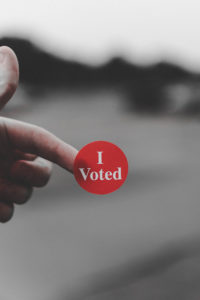Inside the Walls: We Will Vote! Rights Restored for Former Iowa Felons
 Photo by Parker Johnson on Unsplash
Photo by Parker Johnson on Unsplash This post was updated on August 7, 2020
As we count down the days toward the most important election in many of our lifetimes, there is an entire segment of the population in my state of Iowa who will again be able to exercise their fundamental right to vote in November. Iowa prides itself on its status as the “First in the Nation” to cast votes in the presidential caucus, but has been slow to restore voting rights to felons. On August 5, Iowa Governor Kim Reynolds gave many former felons a second chance by signing an executive order to automatically restore their voting rights upon completion of their sentence.
Recently, we’ve seen a push for all types of societal reforms. People are making their voices heard while calling for equality for all and demanding change through peaceful protests, demonstrations, and petitions. Part of being able to make change possible is through exercising your right to vote. An estimated 60,000 citizens in Iowa with a prior felony conviction will now get that opportunity this year.
It was a long, hard road to get to this point. In 2005, Iowa was one of only six states that banned felons from voting for life. On July 4 of that year, Governor Tom Vilsack, a Democrat, signed an executive order automatically restoring voting rights to felons upon completion of their sentence. The Brennan Center for Justice estimates that 115,000 Iowans had their rights restored. Unfortunately, in 2011 Republican Governor Terry Branstad reversed that order, requiring that even after completing their sentences, felons were required to meet difficult requirements such as paying all fines, court costs, and victim restitution in addition to personally petitioning the governor to restore their rights. Under this new policy, very few felons had their rights restored.
Current Iowa Governor Kim Reynolds, also a Republican, announced in her 2019 Condition of the State that part of her “second chances” agenda was to restore felon voting rights through an amendment to the state’s constitution. This process is more permanent than an executive order, but takes at least three years to pass through several stages of voting in the state legislature before being put up to a public vote. Unfortunately, in the two years since making this goal public, Reynolds could not convince her own party to approve it.
Iowa fell behind while other states made restoring voting rights to felons a key component of their criminal justice reforms. According to the Sentencing Project, twenty-three states have partially or fully restored voting rights to felons since 1997. Iowa’s African-American population was most directly affected as one in ten African-American adults in Iowa couldn’t vote due to a prior felony conviction. A 2016 study by the Sentencing Project also found that only four other states had more Black Americans per capita incarcerated than Iowa.
Following the death of George Floyd in May, the local Iowa chapter of Black Lives Matter peacefully protested at the state capitol chanting, “Let them vote!” Following a meeting with protestors, community leaders, and state lawmakers, Governor Reynolds released a statement saying she would sign an executive order by late summer to restore voting rights to felons, with some undetermined restrictions but in time for the November election. Advocates wanted this order signed as soon as possible to ensure these voters had time to register, get needed identification, find polling places and request absentee ballots if necessary.
Governor Reynolds said she was impressed with the group’s commitment to nonviolent protest while also calling them “loud and annoying.” Yet, it’s only by being loud and annoying that any progress was made on this issue. People exercised one right, to assemble and peacefully protest, in order to demand another, the right to vote.
It’s often forgotten that nearly all felons will be released from prison someday. We are people who made a mistake but once we’ve completed our sentence and made a change in our life, we return to society and are essential members of the community; we are your repairmen, grocers, waiters, and even your neighbors. The governor’s executive order is a long overdue step towards achieving equality in my state. She still wants a more permanent amendment, but for now it is great to see people who’ve paid their debt to society receive a second chance.
